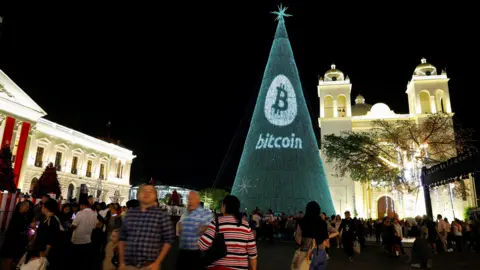El Salvador, a Central American nation, has recently made headlines due to its decision to amend its controversial bitcoin stance in order to secure a significant loan deal with the International Monetary Fund (IMF). The arrangement is valued at $1.4 billion, approximately £1.1 billion, and marks a pivotal shift in the country’s approach to cryptocurrency. This decision comes after the IMF assessed that the risks associated with bitcoin adoption had diminished, allowing for a more measured engagement with the digital asset.
In 2021, El Salvador became the first nation globally to recognize bitcoin as a legal tender, mandating its acceptance for all transactions alongside the US dollar. However, this ambitious policy faced multiple challenges, including public skepticism towards cryptocurrency and its fluctuating value. With the recent announcement, the IMF stated that businesses in El Salvador would now have the autonomy to choose whether or not to engage with bitcoin as a payment option, easing some of the concerns that had previously surrounded its aggressive adoption.
The timing of this policy shift is particularly notable, as it comes soon after bitcoin reached a historic peak, surpassing the $108,000 mark. While the cryptocurrency market is notoriously volatile, such soaring prices can exert tremendous pressure on governments and financial organizations alike. The IMF’s announcement highlighted the importance of legal reforms that will render the acceptance of bitcoin voluntary for the private sector and restrict public sector involvement in bitcoin-related transactions.
Despite the favorable loan agreement that awaits approval from the IMF’s executive board, the IMF had previously expressed explicit discontent with President Nayib Bukele’s fervent promotion of cryptocurrencies. The body warned that continuing down this rocky path could hinder El Salvador’s chances of receiving necessary financial aid. Consequently, this recent agreement can be seen as a compromise that allows El Salvador to maintain some aspects of its bitcoin policy while ensuring that it meets the IMF’s standards for economic stability.
President Bukele has been a vocal proponent of cryptocurrency, often utilizing social media to communicate with the populace and celebrate the rising values of the digital asset. Following the recent surge in bitcoin prices, he claimed that the nation’s investments in cryptocurrencies had significantly increased in value, more than doubling. This optimism contrasts sharply with his political adversaries, whom he blamed for obstructing citizens from benefiting from the cryptocurrency boom.
The political landscape in El Salvador has also intersected with global trends in the cryptocurrency arena. The dynamics shifted notably after Donald Trump’s resurgence in elections, with many in the crypto community expressing optimism for regulatory environments more favorable to cryptocurrency under a Trump administration compared to President Joe Biden’s presidency. The incoming administration is perceived as recognizing the potential growth of digital currencies, thereby potentially catalyzing further adoption.
However, the cryptocurrency market is not without its pitfalls and is currently facing headwinds due to global economic conditions. On a recent Thursday, bitcoin saw a dip in value alongside a decline in global stock markets—a reaction to the US Federal Reserve’s indications of a more gradual approach to interest rate cuts in the upcoming year. Currently, bitcoin’s trading value has settled just below the $100,000 mark, illustrating the ongoing volatility that accompanies this nascent financial asset.
This evolving narrative of El Salvador’s bitcoin journey emphasizes the challenges of cryptocurrency adoption in a world grappling with economic uncertainties and diverse political opinions. The loan agreement with the IMF represents not only a crucial economic lifeline but also a strategic pivot for the nation as it seeks to harmonize its vision for digital currency with global financial norms.



